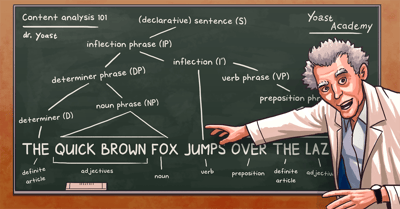How’s your English?

Writing English can be hard, especially if it’s not your first language. But how important is it to use correct English? Does it even matter? In this post, I’ll explain why it’s so important to use correct language in your posts and articles. So: How’s your English?
On a personal note
Most of the writers here at Yoast are Dutch, so our English is by no means flawless. We’ve all done courses to upgrade our writing skills, but most of us are not at native speaking level – yet.
As our company grows, so do the demands on our English skills. We have an awesome content team, but they’re just not native English. That’s why we’ve partnered with howsmyenglish.com, where Patrick and Fiona Barnes edit many of our articles and give feedback on our use of English. We’re learning a lot from them!
Why is language so important?
There are three reasons why the correct use of language is important:
- People will understand your message better;
- Google will understand your message better; and
- Discussions will focus on content (and not on poor use of language).
1. People understand your message
People are less likely to understand the message you’re trying to convey if there are errors in your writing. Perhaps you’re not making ‘real’ mistakes, but you’re using words or composing sentences that just ‘look wrong’ to native speakers. That makes your content harder to read, which makes it more difficult for readers to understand what you’re trying to tell them in your article.
So, using correct language improves the readability of your text and means people will understand your writing much better.
2. Google understands your message
Good language is not in itself a ranking factor. However, Google does read your content to work out what it’s about. So if your grammar is not entirely correct, Google will have a harder time figuring out your message and assessing the topic of your article.
If people have trouble understanding your text, Google will have difficulty as well. Therefore, good grammar will help Google grasp your topic more easily, eventually resulting in Google ranking your articles for the right keywords.
3. Discussions on your content, not your language skills
You want discussions to be about the content of your articles, not your use of language. If you’re making mistakes – typos, misspellings, grammar errors, whatever – trust us when we say that someone is sure to point it out in the comments! And these are not the sorts of comments you want.
You want in-depth discussions about the subject of your post, not about your grammar. Making sure your language is as flawless as possible will create space for the relevant discussions you want to have.
Ask for help to improve your language
Nobody learns to write in a foreign language overnight. Even after extensive practice and writing a Ph.D. in English, I still make lots of mistakes. The best tip I can give you to improve your written language skills is to ask for help from a native speaker of your chosen language. Working together with Pat and Fi from How’s my English is wonderful if you have a budget for it.
Asking for feedback from colleagues and friends can work as well, especially if they are native in the language you are writing in. This second pair of eyes will help you to improve those awkward formulations and to avoid misspellings and grammatical errors. Using an app like Hemingway could also be a big help! Ask for feedback and check the changes people make. That’ll help you to avoid similar mistakes in the future.


Discussion (8)